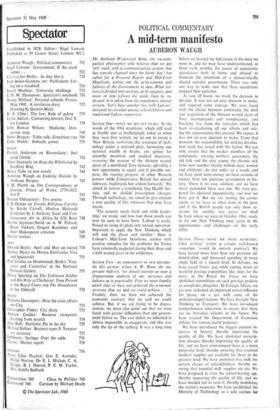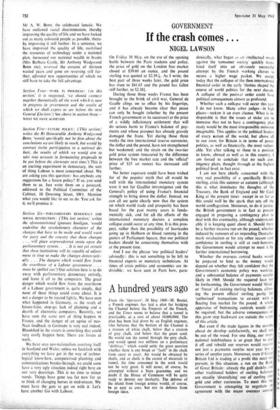A mid-term manifesto
POLITICAL COMMENTARY AUBERON WAUGII
Mr Anthony Wedgwood Benn, the vacuum- packed philosopher who believes that we are 'still stuck with a communications system that has scarcely changed since the Stone Age,' has called for a Progress Report and Mid-Term Manifesto, setting out the achievements and failures of the Government to date. What fol- lows is divided into sections, as he suggestS, and more or less follows the guide lines he in- dicated. It is taken from the manifesto's shorter version. 'Let's have another Go with Labour,' designed to circulate among schoolchildren and traditional Labour supporters.
Section One—WHAT WE SET OUT TO DO: In the words of the 1964 manifesto, which still read as freshly and as challengingly today as when they were first written, we set out to create a 'New Britain, mobilising the resources of tech- nology under a national plan; harnessing our national wealth in brains, our genius for scientific invention and medical discovery; reversing the erosion of the thirteen wasted years of a moribund Tory dynasty; affording a new opportunity to equal, and if possible sur- pass, the roaring progress of other Western powers while Conservative Britain has moved sideways, backwards but seldom forwards.' We aimed to restore a completely free Health Ser- vice, and to abolish prescription charges. Through technology, we aimed to give citizens a new quality of life, whatever that may have meant.
'The country needs fresh and virile leader- ship,' we wrote, and how true those words can now be seen to have been. 'Labour is ready. Poised to swing its plans into instant operation. Impatient to apply the New Thinking which will end the chaos and sterility.' Here is Labour's Mid-Term Manifesto, restless with positive remedies for the problems the Tories have criminally neglected during their three and a half wasted years in the wilderness.
Section TWO—AN ASSESSMENT OF OUR RECORD: (in this section, writes A. W. Benn, the im- portant half-wit, 'we should attempt as near a dispassionate analysis of our successes and failures as is practicable. First we must frankly admit that we have not achieved the economic recovery that we said we could achieve. . . .') Frankly, then, we have not achieved the economic recovery that we said we could achieve. But, if we are trying to be dispas- sionate, we must also point out that we were faced with greater difficulties than any govern- ment before us. The vast deficit we inherited is almost impossible to exaggerate, and this was only the tip of the iceberg. It was a long time before we learned the full extent of the mess we were in, and we may have underestimated, in those early months, the power of unpatriotic speculators—both at home and abroad—to frustrate the intentions of a democratically elected socialist government. There was only one way to make sure that these speculators stopped their activities.
As you all know, we made the decision to devalue. It was not an easy decision to make, and required some courage. We were faced with the choice between continuing the drift and stagnation of the thirteen wasted years of Tory incompetence and complacency, and breaking free from the restraints which had been straitjacketing all our efforts and seiz- ing the opportunities this created. We repeat, it was not an easy decision to make. From that moment, the responsibility for making devalua- tion work has rested with the nation. We can only ensure that the weaker members of the community—nursing mothers, pensioners, the old folk and the very young, the chronic sick (who now number twenty million men, women and children)—do not suffer as a result, and we have spent more money on these sections of society than any previous government in his- tory. There is no easy solution, and we have never pretended there was one. We were pre- pared for electoral unpopularity, and now we have got it. But we are turning the corner again, as we have so often done in the past, and if the British people can only show re- straint for another two years, we shall be back where we were in October 1964, ready to try our New Thinking once again in the opportunities—and challenges—of the early 1970s.
Section Three—WHAT WE HAVE ACHIEVED: ('this section,' writes a certain well-known comedian, 'would be entirely positive'). We have passed more laws than any previous ad- ministration, and increased spending in every single field to a record level. In defence, we have raised forces' pay while cutting down on wasteful prestige expenditure like ships for the navy; in the Royal Air Force we have abolished expenditure on such prestige projects as aeroplanes altogether. In Foreign Affairs, we are now reckoned an important moral influence for peace, on a par with some of the underdeveloped nations. We have brought New Thinking to Transport. We have introduced comprehensive education, to ensure that there are no first-class citizens in the future. We have created the Department of Economic Affairs, for various useful purposes.
We have introduced the biggest pension in- creases in history, thereby improving the quality of life. We have abolished prescrip- tion charges, thereby improving the quality of life, and we have reintroduced them at a more purposive level, thereby ensuring that essential medical supplies are available for those in the greatest need. We have abolished free milk for certain classes of schoolchildren, thereby en- suring that essential milk supplies etc etc. We have proposed to raise the school-leaving age, thereby improving the quality of life, and we have decided not to raise it, thereby mobilising the nation's resources. We have established the Ministry of Technology as a safe asylum for Mr A. W. Benn, the celebrated lunatic. We have outlawed racial discrimination, thereby improving the quality of life and we have locked out as many coloured people as possible, there- by improving it still further. In a sentence, we have improved the quality of life, tnobilised the resources of technology under a national plan, harnessed our national wealth in brains (Mrs Barbara Castle, Mr Anthony Wedgwood Benn etc); reversed the erosion of thirteen wasted years and gone on reversing still fur- ther; afforded new opportunities of which we still have to take the full advantage.
Section Four—woRK IN PROGRESS: ('in this section,' it is suggested, 'we should connect together thematically all the work which is now in progress in government and the results of which we shall expect to see before the next General Election.') See above in section three—
WHAT WE HAVE ACHIEVED.
Section Fire—FUTURE POLICY: (This section,' writes the Rt Honourable Anthony Wedgwood Benn, 'would specifically not be firm about the conclusions we are likely to reach, but would by contrast invite participation in a national de- bate, the results of which we would aim to take into account in formulating proposals to be put before the electorate next time!) This is an exciting experiment in democracy, the sort of thing Labour is most concerned about. We are asking you this question : has anybody any suggestions for a future policy? If so, you send them to us. Just write them on a postcard, addresed to the Political Committee of the Cabinet, 10 Downing Street, SW I. Mention what you would like to see us do. You ask for it, we'll promise it.
Section SiX—PARLIAMENTARY DEMOCRACY AND SOCIAL REVOLUTION: ('This last section,' writes the aforementioned ignorant hooligan, 'would underline the revolutionary character of the changes that have to be made and would warn the party and the country that these changes . . . will place unprecedented strain upon the parliamentary system. . . It is not yet certain that these institutions will be capable of adjust- ment in time to make the changes democratic- ally. . . . The dangers which would flow from the overthrow of a Labour government . . must be spelled out.') Our solution here is to do away with parliamentary democracy entirely, and leave it all to the computers. The great danger which would flow from the overthrow of a Labour government is, quite simply, that none of these things could come about. It is not a danger to be treated lightly. We have seen what happened in Germany. as the result of laissez-faire, stop-go, lack of planning and a dearth of electronic computers. Recently, we have seen the same sort of thing happen in France, and the danger of an uprise of neo- Nazi feedback in Germany is very real indeed. Bloodshed in the streets is something that could very easily happen here. There are forces at work.
We have seen neo-nationalism asserting itself in Scotland and Wales; unless we backlash with everything we have got in the way of techno- logical know-how, computerised planning and communications breaks-through, we could soon have a very ugly situation indeed right here on our very doorsteps. This is no time to mince words. Things have gone too far now for us to think of changing horses in mid-stream. We must have the guts to get on with it. Let's have another Go with Labour.







































 Previous page
Previous page